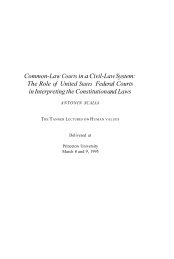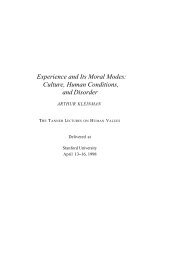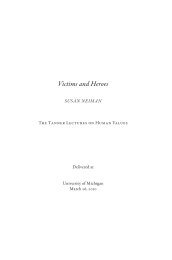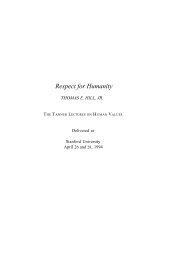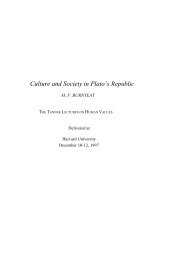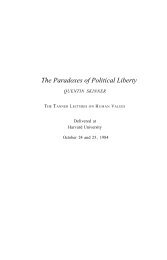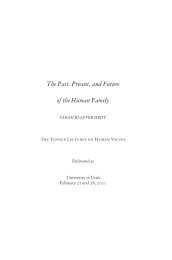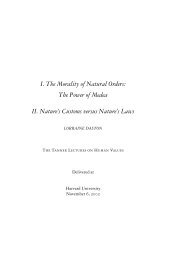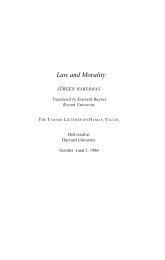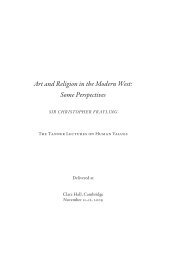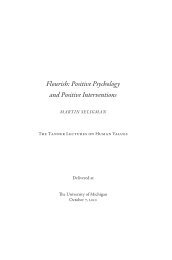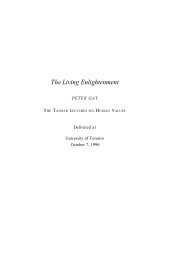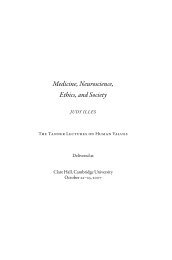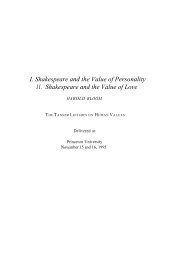Muguerza, Javier - The Tanner Lectures on Human Values
Muguerza, Javier - The Tanner Lectures on Human Values
Muguerza, Javier - The Tanner Lectures on Human Values
You also want an ePaper? Increase the reach of your titles
YUMPU automatically turns print PDFs into web optimized ePapers that Google loves.
[MUGUERZA] <str<strong>on</strong>g>The</str<strong>on</strong>g> Alternative of Dissent 79liberty, or equality are the exclusive patrim<strong>on</strong>y of the jusnaturalisttraditi<strong>on</strong>.To c<strong>on</strong>centrate for the moment <strong>on</strong> the first of these, who wouldassert that the jusnaturalist traditi<strong>on</strong> and the traditi<strong>on</strong> of humanrights are coextensive? Pérez Luño adduces the case of SamuelPufendorf, whose system of human rights indeed rests <strong>on</strong> the ideaof the dignitus of man. 7 And there is no doubt about Pufendorf’srepresenting an important stage in the history of modern naturallaw. But, <strong>on</strong> the other hand, it is not as clear that we can discernthe same jusnaturalist filiati<strong>on</strong> in the Kantian noti<strong>on</strong> of Würde,nor in Kant’s philosophy of law. 8 And the case of Kant is of particularinterest to us here.No <strong>on</strong>e would deny that there are abundant traces of jusnaturalistinfluence in Kant, just as it is impossible to deny that thegeneral divisi<strong>on</strong> of the Rechtslehre, or “system of the principlesof law,” that he espouses opposes natural law (Naturrecht),which is based <strong>on</strong> a priori principles, to positive, or statutory, law(statutarisches Recht), which depends <strong>on</strong> the will of the legislator.9But Kant’s so-called “rati<strong>on</strong>al law” (Vernunftrecht) cannotsimply be identified with traditi<strong>on</strong>al natural law, even of arati<strong>on</strong>alist lineage, not even if we find that it does not mind assuming- <strong>on</strong> the basis of quite different suppositi<strong>on</strong>s - some of thelatter’s functi<strong>on</strong>s, which it c<strong>on</strong>sequently inherits. l0And, especially,I do not believe we can or should interpret in a jusnatu-7 Ibid. In this c<strong>on</strong>necti<strong>on</strong> see Hans Welzel’s classic Die Naturrechtslehre SamuelPufendorfs, 2d ed. (Berlin, 1958).8 On this subject, see J, G. Murphy, Kant: <str<strong>on</strong>g>The</str<strong>on</strong>g> Philosophy of Right (L<strong>on</strong>d<strong>on</strong>,1970); S. Goyard-Fabre, Kant et le problème du droit (Paris, 1975); Z. Batscha, ed,.Materialien zu Kants Rechtsphilosophie (Frankfurt am Main, 1976) ; F. Kaulbach,Studien zur späten Rechtsphilosophie Kants (Wiirzburg, 1982) ; H.-G. Deggau,Die Aporien der Rechtslehre Kants (Stuttgart, 1983).9 I. Kant, Metaphysik der Sitten. I. Metaphysische Anfangsgründe der Rechtslehre,Werke, Akademie Ausgabe, vol. 6, p. 237. All references to Kant’s worksare to this editi<strong>on</strong>.10 See below, in c<strong>on</strong>necti<strong>on</strong> with Jürgen Habermas’s interpretati<strong>on</strong> of Kant’s“rati<strong>on</strong>al law.”



